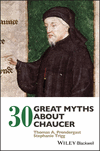CHAUCER WAS A FEMINIST
Summary
In an anxious and sometimes angry contemporary world, where many of the traditional forms and practices of literary studies are often challenged by decolonizing, feminist and queer perspectives, Chaucer is sometimes dismissed as a figure of privileged white male. When Chaucer ventures to express general attitudes to women, they are almost invariably associated with contest and conflict of some kind. Sometimes they take the form of this kind of throw-away remark. Sometimes his feminist and anti-feminist statements are hard to read through layers of a kind of habitual tonal awkwardness, as in the uncomfortable closure to the Clerk's Tale. As many critics observe, Troilus and Criseyde is a poem about predestination and free will. The poem is also particularly alert to the special disempowerment of women in a patriarchal society where women are “exchanged” between men.



